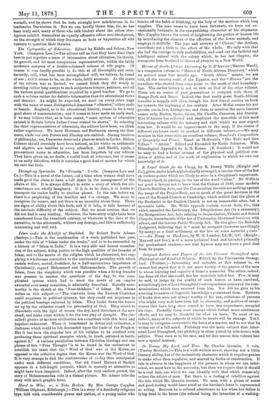A Legal Guide for the Clergy, by R. Donny Willis
(Knight and Co.), gives, under heads alphabetically arranged, a conchte view of the law on various points which are likely to arise in a clergyman's experience. We may object, in passing, to the use of the word "altar." Mr. Willis is too good a lawyer not to know that the Canons of 1610, some modern Church-Building Acts, and the Consecration Service are nothing against the usage of the Prayer-Book, not to speak of the great decision in the case of the Round Church at Cambridge, which settled that the place of the Eucharist in the English Church is not an immovable altar, but a moveable table. Mr. Willis appends certain recent Acts, viz., that which amended the Lectionary, the Dilapidations Act (in a summary), the Resignations Act, Acts relating to Sequestration, Private and School Chapels, Amendments of the Act of Uniformity, Shortened Services, with others, and the famous Public Worship Act. He also gives the Ridsdale Judgment, believing that it "must be accepted (however unwillingly by many) as a final settlement of the law on some material -pints."
An Essay on By-Laws, by W. G. Lumley, LL.M., Q.C. (Knight ; Maxwell and Son), is of a more technical kind, and intended primarily for professional readers,—not that laymen may not learn a good deal from its pages.






































 Previous page
Previous page